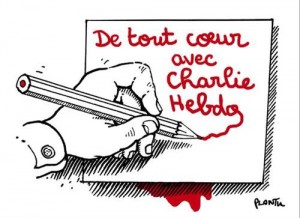Stefan Constantinescu, Quartz, January 7, 2014–Three gunmen stormed the offices of a French satirical magazine called Charlie Hebdo around lunchtime on Wednesday (Jan. 7), brandishing AK-47s and a rocket launcher. The assailants killed 12 people and wounded five others. Among those dead are the magazine’s publisher, Stéphane Charbonnier; three cartoonists: Jean Cabut, Georges Wolinski, and Bernard Verlhac; and writer and economist Bernard Maris. Gérard Biard, the magazine’s editor-in-chief, was in London at the time.
Bernard Cazeneuve, the country’s interior minister, says the country is now on high alert and that his main goal is “to neutralize these three criminals who have committed this barbaric act”. President François Hollande has condemned the attacks, calling them “an exceptional act of barbarism”, and that France needs to “show we are a united country” by being “firm and strong”. German chancellor Angela Merkel echoed similar sentiments, saying today was an “attack on freedom of speech and the press, core elements of our free democratic culture. In no way can this be justified.”
Charlie Hebdo is no stranger to controversy. The magazine, started in 1969, drew ire in 2006 (link in French) for republishing cartoons of the prophet Mohammed that had appeared previously in Norways Jyllands-Posten. In 2011 it was firebombed (paywall) after publishing a issue purportedly “guest edited” by the prophet and entitled “Sharia Hebdo.” One year later it published more cartoons, prompting France to close embassies and schools in 20 different countries.


 Follow
Follow